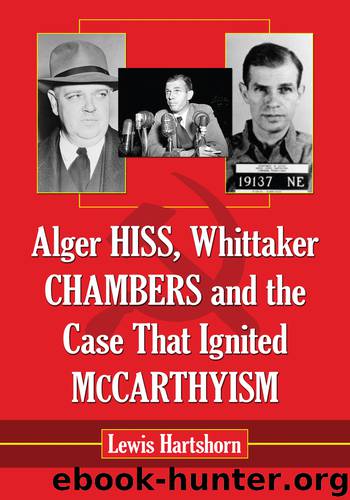Alger Hiss, Whittaker Chambers and the Case That Ignited McCarthyism by Lewis Hartshorn

Author:Lewis Hartshorn
Language: eng
Format: epub
Publisher: McFarland & Company, Inc., Publishers
Published: 2013-07-07T16:00:00+00:00
But by September the FBI and State Department security had still not obtained concrete evidence of Hiss’s disloyalty. Hoover had expected Byrnes to fire Hiss or at least force him out of government, but it didn’t happen. So Hoover commenced another round of leaks and slanders to his supporters in Congress and the media. Walter Winchell, the celebrity gossipmonger who was always accommodating to the Master of Deceit, announced on September 29, in an obvious reference to Hiss: “It can be categorically stated that the question of the loyalty and integrity of one high American official has been called to the attention of the President.”
Rumors of Communist associations actually led Alger Hiss to remain at the State Department longer than he had planned. “I did not wish to appear to be leaving under fire,” Hiss wrote in his memoir. “The cold war had already led me to conclude that we would make little use of the UN, and I had therefore decided that my position as coordinator of our policies toward the UN would no longer be rewarding. But I stayed on for another year, by the end of which I felt confident that the FBI story had been laid to rest.”
A year before Hiss left government service, while aboard the Queen Elizabeth en route to London for the U.N.’s premier meeting of the General Assembly in January 1946, John Foster Dulles, a member of the delegation, asked Hiss if he intended to remain indefinitely at State. When Hiss indicated he did not, Dulles inquired if he would be interested in succeeding Nicholas Butler as president of the Carnegie Endowment. Initially Hiss was not “seriously tempted,” and Dulles could not make a commitment because his own election as chairman of the board of trustees of the Endowment was not scheduled until May. Yet Dulles thought Hiss a top candidate because he had met him at the San Francisco conference and admired Hiss and his accomplishments there.
Dulles was probably unaware that he had been recommended in early 1945 as an adviser to the U.N. delegation by Hiss and Stettinius, despite the protest of President Roosevelt who felt Dulles would not be in sympathy with FDR’s foreign policies. But for domestic political reasons Hiss and Stettinius prevailed upon Roosevelt to accept Dulles, who was in the unique position of advising two potential Republican presidential candidates—New York governor Thomas Dewey and Senator Vandenberg of Michigan—on foreign policy. As the senator was one of the delegates, it was important to give a prominent role to someone who had Dewey’s confidence as well, and only Dulles met this requirement. Moreover, Dulles’s appointment would promote the bipartisanship so vital in assuring wide public support for the U.N.
Dulles agreed in 1945 to become chairman of the board of trustees of the Carnegie Endowment on the condition that he could appoint a fulltime president to handle all the administrative duties. His high regard for Alger Hiss was reinforced by the recommendations of journalists to whom Dulles had mentioned
Download
This site does not store any files on its server. We only index and link to content provided by other sites. Please contact the content providers to delete copyright contents if any and email us, we'll remove relevant links or contents immediately.
| Anarchism | Communism & Socialism |
| Conservatism & Liberalism | Democracy |
| Fascism | Libertarianism |
| Nationalism | Radicalism |
| Utopian |
The Secret History by Donna Tartt(19045)
The Social Justice Warrior Handbook by Lisa De Pasquale(12185)
Thirteen Reasons Why by Jay Asher(8887)
This Is How You Lose Her by Junot Diaz(6875)
Weapons of Math Destruction by Cathy O'Neil(6263)
Zero to One by Peter Thiel(5786)
Beartown by Fredrik Backman(5737)
The Myth of the Strong Leader by Archie Brown(5496)
The Fire Next Time by James Baldwin(5429)
How Democracies Die by Steven Levitsky & Daniel Ziblatt(5211)
Promise Me, Dad by Joe Biden(5141)
Stone's Rules by Roger Stone(5080)
A Higher Loyalty: Truth, Lies, and Leadership by James Comey(4948)
100 Deadly Skills by Clint Emerson(4919)
Rise and Kill First by Ronen Bergman(4777)
Secrecy World by Jake Bernstein(4740)
The David Icke Guide to the Global Conspiracy (and how to end it) by David Icke(4699)
The Farm by Tom Rob Smith(4502)
The Doomsday Machine by Daniel Ellsberg(4484)
